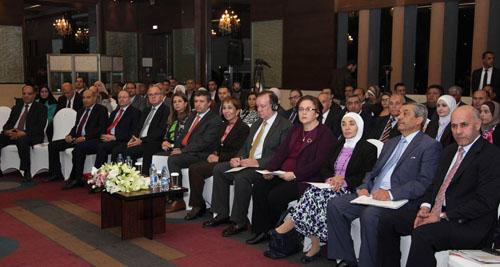You are here
Vocational education still lags behind academic stream — experts
By Laila Azzeh - Jun 14,2017 - Last updated at Jun 14,2017
AMMAN — Vocational and technical education in Jordan continues to take a back seat to academic certificates, despite skilled human resources being deemed a prerequisite for development and an “antidote” for unemployment, according to experts.
Despite a political will to boost vocational and technical training, statistics show that more than 80 per cent of school graduates in Jordan prefer to pursue academic, rather than vocational, education.
According to a report prepared by the Higher Population Council (HPC), the overall ratio of students enrolled in vocational and technical training programmes stood at 17.5 per cent in 2011, 17.7 per cent in 2012 and 17 per cent in 2013.
The percentage of technical and vocational graduates in the Jordanian labour market stood at 14.2 per cent in 2013, the HPC showed.
At a meeting held on Monday to follow up on the implementation of the National Strategy for Development of Human Resources 2016-2025, His Majesty King Abdullah underlined the need to “infuse technology into education and implement structural reforms in the vocational education sector”.
The government has to accelerate the process of restructuring the vocational and technical training as a priority, the King said.
“The King has been calling for restructuring technical and vocational education for quite a while… it is a multifaceted issue that started when academic education was economically, socially and professionally favoured over vocational jobs,” former education and higher education minister Walid Maani told The Jordan Times on Tuesday.
He noted that challenges facing this type of education in Jordan start with the way its graduates are perceived, not only socially, but also professionally.
He explained that the civil service by-law put holders of vocational diplomas in a “second category” after graduates of higher academic programmes.
“Moreover, vocational professionals are unable to progress in their career. They cannot become directors when assuming government jobs,” Maani said, noting that Jordanians’ reluctance to enroll in vocational work in light of the barriers is “normal human behaviour”.
Even institutions like the Balqa Applied University, which was first established as an umbrella for community colleges, “diverted” its mission to becoming a “typical academic university that offers programmes in history and Arabic language”, according to the former minister.
He cited the establishment of Prince Hussein Bin Abdullah II Technical University, which will see 300 students graduate this year, as a step forward.
On the other hand, Maani underlined the need for industry to support technical and vocational training institutions in order to see the most desired benefits.
The Vocational Training Corporation (VTC) has been calling on the private sector to lead vocational training programmes, as it is the main employer of their graduates.
Education expert Bilal Jayousi noted that vocational training should be linked to students’ abilities and, thus, should direct them to vocational education from an early age, similarly to developed countries.
“There should be a clear strategy that classifies students who will be able to join technical and vocational institutions,” he said.
While agreeing with him, Maani noted that the classification method should not mean that low-performing students are the ones heading to vocational professions.
“This contributes to the unattractiveness of the sector. Students should be exposed to the benefits of opportunities provided by vocational work,” he highlighted.
The Education Ministry has been cooperating with the Labour Ministry and the VTC to encourage students to enroll in vocational training programmes, enabling students to pursue their technical diplomas, without having to apply to the Tawjihi.
Related Articles
AMMAN — A total of 3,521 male and female holders of university and community college diploma qualifications enrolled on the Vocational Train
AMMAN — While experts cite vocational trainings’ challenges in Jordan, the Vocational Training Corporation (VTC)emphasise that its tra
AMMAN — If Jordan fails to capitalise on technical and vocational training in the coming years, it will be a major setback to its endeavours
















